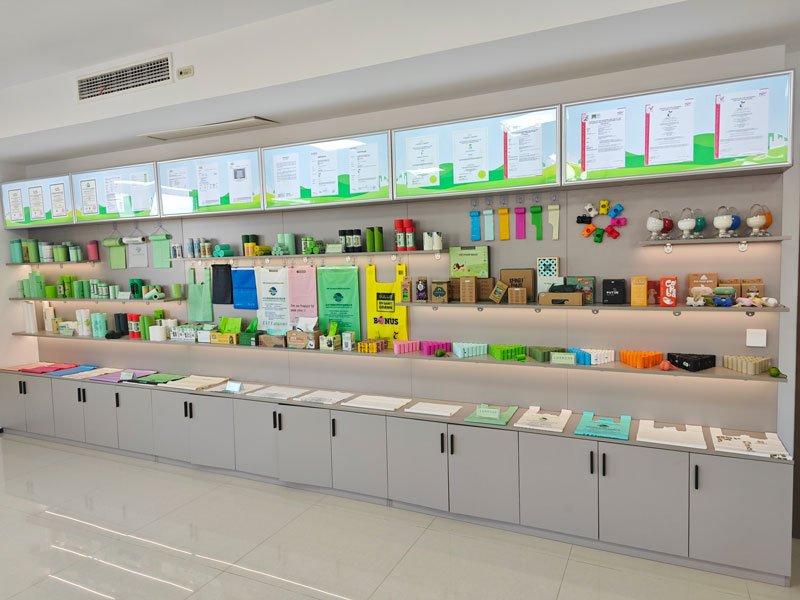With growing environmental awareness, many companies are using sustainable, environmentally friendly compostable bags for their product packaging. However, when it comes to purchasing, what truly makes a compostable bag? What are the standards for compostable bags? Are compostable bags truly biodegradable? With so many products on the market, how do we choose?
Compostable eco friendly bags come in a wide variety of styles, and many "greenwashed" products are sold in one-time use. Using such products can damage our company's brand image, lead to significant cost losses, and fail to meet environmental standards.
As a manufacturer with 16 years of experience in biodegradable and compostable bags, this article will explain how to choose a compostable bag. We hope this will help you make the right choice and minimize losses.
How to Choose Compostable Bag
1.Understand the Application Scenario for the Bags You Buy
What will my bag be used for and where will it be used? This is the first step.
Retail Compostable Shopping Bags: High weight capacity (5-10 kg) is required, and the feel and printing are also key considerations. Thicker bags are recommended, and steel printing is preferred for better results.
Food Takeout Bags: Oil and leak resistance, as well as the ability to hold hot food are important requirements. Excellent sealing properties are particularly important, and thicker bags are recommended.
E-commerce Compostable Mailing Bags: The rapid development of the e-commerce industry requires strong, waterproof, and airtight bags that are lightweight to reduce shipping costs. They must also withstand the pressure and friction of logistics.
Produce Compostable Bags: Because they come into direct contact with food, the safety requirements for the bags are relatively high, and breathability is also a consideration. For food or fresh produce, they must comply with food contact safety standards (such as FDA or EU 10/2011).
Pet poop bags: For small dogs, portability and compactness are paramount. However, for larger or extra-large dogs, thickness and waterproofing are important.
2.Authoritative Certification
Is it truly compostable? A professional certification agency can help identify it. Uncertified bags may simply be "biodegradable" rather than "compostable," meaning they won't completely decompose in industrial or home composting environments.
Professional Certification Marks:
- BPI (Biodegradable Products Institute): The most authoritative compostability certification in North America (the US and Canada), guaranteeing that the product will completely decompose in industrial composting facilities and suitable for the US and Canadian markets.
- TÜV AUSTRIA (OK compost HOME / INDUSTRIAL): The most recognized certification in Europe, divided into "OK compost INDUSTRIAL" (for industrial composting) and "OK compost HOME" (for home composting). Home composting certification, suitable for small or home use, has higher requirements.
- EN 13432 / ASTM D6400: International technical standards for compostable products, specifying the product's decomposition rate (above 90%), biotoxicity, and heavy metal content in a composting environment.
Check the product packaging, supplier's website, or the product itself for professional certification marks. Request a copy of the supplier's certification to ensure authenticity. Be wary of claims that simply claim the product is "environmentally friendly" without specific certification.

3.Bag Weight and Material
Bag thickness is usually measured in microns or mils to indicate its weight-bearing capacity. Some bags are very thin and leak when held in a small amount, so weight-bearing capacity is a key consideration.
Compostable bag materials:
- PLA (polylactic acid): Made from a natural plant-based material, it offers good stiffness but lacks firmness.
- PBAT (a type of polyester): Offers good flexibility and strength.
4.Product Customization:
Can I print my logo on the bags? "Can I print my logo on the bags?" Customization can enhance brand recognition, convey the brand's sustainable values, and enhance the customer experience.
Things to confirm with the supplier:
- Number of printing colors.
- Minimum Order Quantity (MOQ).
- Design requirements.
5.Choose a Reliable Manufacturer and Distributor
Reliable manufacturers and distributors can ensure product quality, guarantee regular delivery, and accommodate bulk customization needs. If we encounter any issues, their professional customer service will respond promptly, and transparent quotes help us make decisions quickly.
- Verify whether the company's supply chain is robust and can deliver on time.
- Pay attention to the company's reputation online to ensure a reliable supplier.
- Ideally, visit the manufacturer to verify its scale, capabilities, and expertise to determine if it can produce custom bags.
- Verify whether the company has professional certifications to ensure quality.
Common Misconceptions:
1.Confusing "Biodegradable" with "Compostable"
"Biodegradable" simply means that a product will eventually decompose, which may take years and may release harmful substances during the decomposition process.
"Compostable" products are biodegradable, but they must break down quickly into harmless substances in a specific composting environment (industrial or household).
It is best to request BPI or TÜV AUSTRIA certification from suppliers.
2.Ignoring Professional Certifications
Many suppliers use verbal promises or vague "eco-friendly" labels to attract customers, but lack professional and authoritative certifications. This makes the products non-compostable. Insist on checking the certifications and verifying their effectiveness on the official website of the certified product.
3.Pursuing Cheapness Over Quality
Some suppliers lure customers with low prices for compostable bags, then make minor adjustments to the raw materials and thickness. This results in insufficient thickness, high breakage rates, and ultimately increased costs. Therefore, it is important to consider price, thickness, weight-bearing capacity, flexibility, and other factors before comparing and selecting cost-effective, sustainable, and environmentally friendly compostable bags.
Conclusion
Choosing the right compostable bags can help enhance your company's brand reputation. When choosing, consider the factory's scale and expertise.
If you'd like custom biodegradable bags, please contact us or visit our factory at any time. If needed, you can also request BPI-certified samples tailored to your business needs. Contact our team today.
We're happy to help you customize a compostable bag solution that's tailored to your brand.





